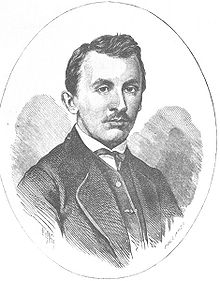Svetozar Marković
Svetozar Marković (born September 9, 1846 in Zaječar , Serbia ; † February 26, 1875 in Trieste , then Austria-Hungary , now Italy ) was a publicist, politician and the first Serbian socialist.
He attended grammar schools in Kragujevac and Belgrade before starting an academic career. With a state scholarship in his pocket, he finally came to Saint Petersburg and Zurich , where he came into contact with socialist groups for the first time and studied scientific Marxism .
Marković began to publish early on. After his scholarship was withdrawn because of membership in a subversive organization in Novi Sad , he began to grapple more closely with the social conditions in Serbia. Above all, he attacks the prevailing bureaucratism. From 1871 to 1872 he edited the magazine Radenik (German worker) and in 1873 the magazine Javnost .
Socialist and literary critic
In addition to his role as the first socialist theorist in Serbia, he is also of importance in literary history. He is considered one of the pioneers of Serbian realism and dealt with the problems of literary studies himself. Against the romantic currents in Serbia, he defended the realistic literary tradition in his writings Pevanje i mišljenje (Poetry and Thinking, 1871) and Realni pravac u nauci i životu (The realistic path of knowledge and life, 1872).
As a socialist, Marković feels called to change social conditions with the help of revolutionary masses. His most important work is the critical work Srbija na istoku ( Eng . Serbia in the East), in which he deals with the conditions in Serbia at that time.
Sentenced to nine months' imprisonment for insulting the state in 1874, Marković fell ill with tuberculosis shortly afterwards . He dies in Trieste at the age of 28 .
effect
As a literary critic and committed socialist, Marković had a lasting influence on the development of the Serbian literary scene. Today he is considered an important intellectual in the Serbian intellectual history of the late 19th century. Many schools and streets in Serbia are still named after him.
Web links
| personal data | |
|---|---|
| SURNAME | Marković, Svetozar |
| BRIEF DESCRIPTION | Publicist, politician and first Serbian socialist |
| DATE OF BIRTH | September 9, 1846 |
| PLACE OF BIRTH | Zaječar , Serbia |
| DATE OF DEATH | February 26, 1875 |
| Place of death | Trieste |
